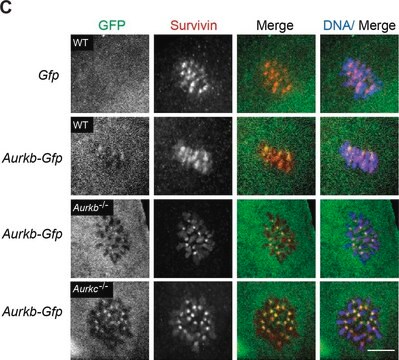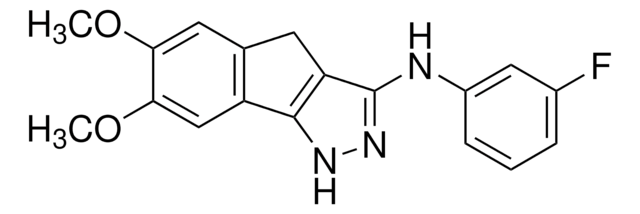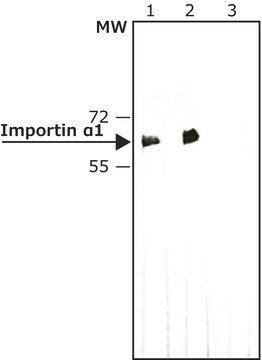I7526
Anti-Interleukin-4 antibody produced in goat
affinity isolated antibody, lyophilized powder
Synonym(s):
Anti-IL-4
Sign Into View Organizational & Contract Pricing
All Photos(1)
About This Item
Recommended Products
biological source
goat
Quality Level
conjugate
unconjugated
antibody form
affinity isolated antibody
antibody product type
primary antibodies
clone
polyclonal
form
lyophilized powder
species reactivity
human
technique(s)
indirect ELISA: suitable
neutralization: suitable
western blot: suitable
UniProt accession no.
storage temp.
−20°C
target post-translational modification
unmodified
Gene Information
human ... IL4(3565)
General description
Interleukin-4 (IL-4) is a T cell derived chemokine that stimulates the Th2 mediated immune response and proliferation of B cells. The effects of IL-4 are mediated by two types of receptors, type I receptor consisting of IL-4Rα and common γ chain and type II receptor composed of IL-4Rα and IL-13Rα1. The signaling stimulated by IL-4 leads to activation of JAK/STAT6 and IRS-mediated PI3K/Akt pathway. Through these pathways, IL-4 is responsible for endocytic activity of macrophages, chemotaxis of leukocytes in response to inflammation, angiogenesis and regulation of nitric oxide metabolism in macrophages. Anti-tumor effects of IL-4 have been reported in cancers of breast, liver and renal cells. Anti-Interleukin-4 specifically recognizes human interleukin-4. The antibody shows no cross reactivity with rmIL-4 and rrIL-4.
Specificity
The antibody will neutralize the biological activity of recombinant human IL-4, but not recombinant mouse IL-4.
Immunogen
recombinant human IL-4.
Application
Anti-Interleukin-4 antibody may be used for immunoblotting at a working concentration of 0.1-0.2 μg/ml. For ELISA, a working concentration of 0.5-1.0 μg/ml is recommended. The antibody may be used for immunohistochemistry of cultured cells or tissue sections at a working antibody concentration of 0.5-5 μg/ml. The antibody is suitable for neutralization assay; ND50 is 0.02-0.1 μg/ml. Anti-IL-4 antibody was used for immunohistochemistry and ELISA using cervicovaginal tissue sections and cervicovaginal extracts of Belgium white rabbits.
Applications in which this antibody has been used successfully, and the associated peer-reviewed papers, are given below.
Immunohistochemistry (1 paper)
Immunohistochemistry (1 paper)
Physical form
Lyophilized from 0.2 μm filtered solution in phosphate buffered saline with 5% trehalose.
Disclaimer
Unless otherwise stated in our catalog or other company documentation accompanying the product(s), our products are intended for research use only and are not to be used for any other purpose, which includes but is not limited to, unauthorized commercial uses, in vitro diagnostic uses, ex vivo or in vivo therapeutic uses or any type of consumption or application to humans or animals.
Not finding the right product?
Try our Product Selector Tool.
related product
Product No.
Description
Pricing
Storage Class Code
11 - Combustible Solids
WGK
WGK 1
Flash Point(F)
Not applicable
Flash Point(C)
Not applicable
Personal Protective Equipment
dust mask type N95 (US), Eyeshields, Gloves
Choose from one of the most recent versions:
Already Own This Product?
Find documentation for the products that you have recently purchased in the Document Library.
Toll-like receptors and cytokines as surrogate biomarkers for evaluating vaginal immune response following microbicide administration
Gupta SM et al
Mediators of Inflammation, doi: 10-doi: 10 (2008)
Investigational therapeutics targeting the IL-4/IL-13/STAT-6 pathway for the treatment of asthma
Oh CK et al
European Respiratory Review, 19, 11546-11554 (2010)
M Stein et al.
The Journal of experimental medicine, 176(1), 287-292 (1992-07-01)
Expression of the macrophage mannose receptor is inhibited by interferon gamma (IFN-gamma), a T helper type 1 (Th-1)-derived lymphokine. Interleukin 4 (IL-4), a Th-2 lymphocyte product, upregulates major histocompatibility class II antigen expression but inhibits inflammatory cytokine production by macrophages.
Alberto Mantovani et al.
Trends in immunology, 25(12), 677-686 (2004-11-09)
Plasticity and functional polarization are hallmarks of the mononuclear phagocyte system. Here we review emerging key properties of different forms of macrophage activation and polarization (M1, M2a, M2b, M2c), which represent extremes of a continuum. In particular, recent evidence suggests
E M Coccia et al.
International immunology, 12(7), 977-985 (2000-07-06)
NO is a labile radical involved in several immunological, antimicrobial and inflammatory processes. In macrophages, NO formation is catalyzed by the cytokine-inducible enzyme inducible NO synthase (iNOS). The importance of IFN regulatory factor (IRF)-1 and of the signal transducers and
Our team of scientists has experience in all areas of research including Life Science, Material Science, Chemical Synthesis, Chromatography, Analytical and many others.
Contact Technical Service








